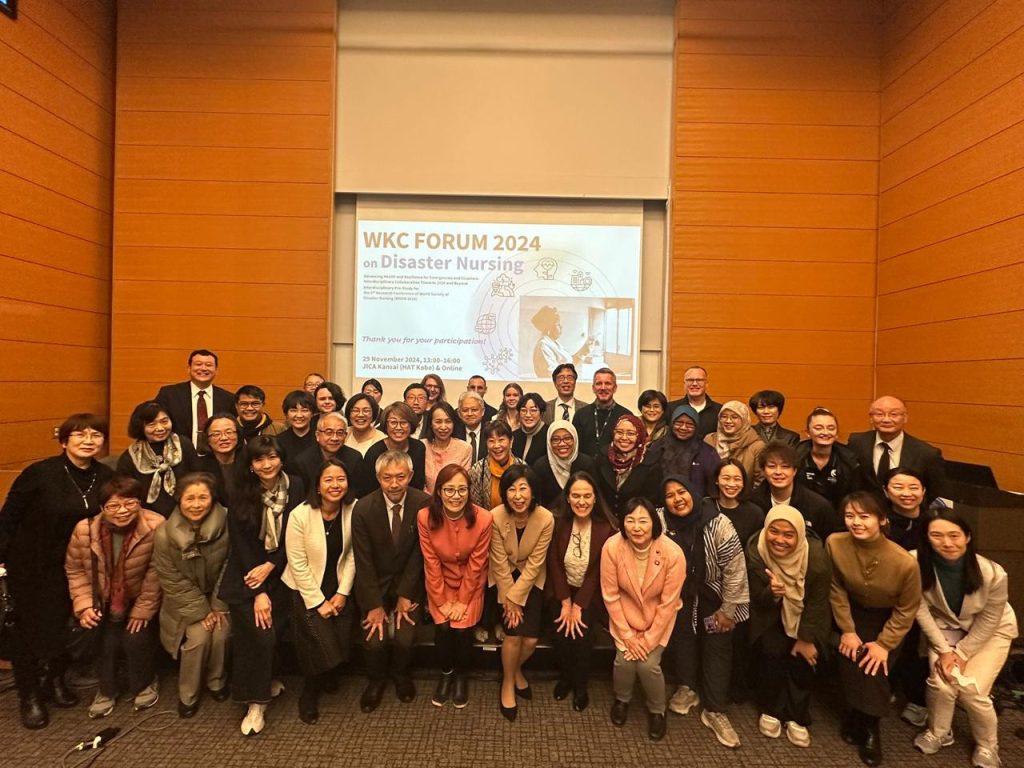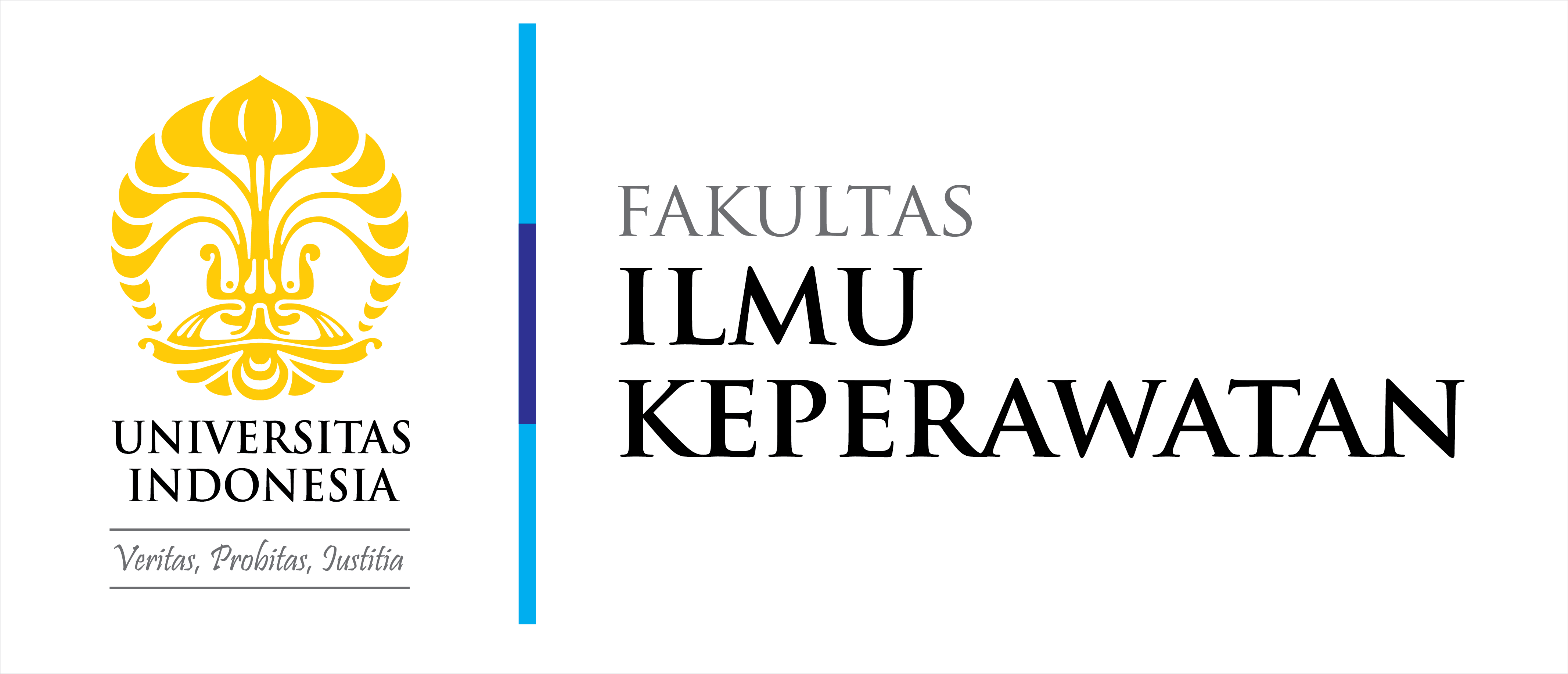
The Faculty of Nursing of the University of Indonesia (FoN UI) represented Indonesia at the 8th World Society of Disaster Nursing (WSDN) international conference which took place from 29 November to 1 December 2024 at Kobe City College of Nursing, Japan. With the theme ‘Rethinking Disaster Nursing in the Changing Risk Landscape’, the conference featured delegates from various countries, including Germany, Australia, Japan, Korea, and Indonesia. The conference was an important platform to discuss the new dynamics and challenges faced by nurses in disaster situations. The theme highlighted how the changing global risk landscape, such as pandemics, natural disasters, and the impact of climate change, requires significant adaptation within the nursing profession.
The COVID-19 pandemic is one clear example where nurses play a key role in maintaining the stability of the health system. In this situation, nurses are not only tasked with providing direct services to patients but also become health educators, vaccinators, researchers, and logistical drivers in crisis management. Challenges include limited resources, threats to personal health, and severe emotional distress due to rising patient mortality rates and extreme workloads.
In addition to pandemics, nurses also spearhead natural disasters such as earthquakes, floods, or forest fires. Climate change exacerbates these risks by increasing the frequency and intensity of disasters, which directly increases the need for more flexible and responsive nursing strategies. In these situations, nurses' ability to work amidst uncertain and often dangerous environments is critical to ensuring public safety and health.
The 8th WSDN conference highlighted the importance of an interdisciplinary approach in preparing health workers for disaster situations. Discussions in this forum included the use of big data in disaster mitigation, community-based disaster education, and strategies to build the resilience of health workers. Delegates from various countries, including Indonesia, represented by the Faculty of Nursing, University of Indonesia (FoN UI), provided insights into best practices and innovations in the field of disaster nursing.
The FoN UI delegation, consisting of Ns. Suryane Sulistiana Susanti, Ph.D; Ns. Rona Cahyantari Merduaty, M.Adv.N; Ns. Indah Permata Sari, M.Kep, Sp.Kep.Kom; and Ns. Arcellia Farosyah Putri, Ph.D, presented a research entitled ‘Nurse Resilience in Facing Challenges During the Pandemic: Roles, Challenges, and Strategies.’ The study described the multiple roles of nurses during the pandemic, including direct patient care (59%), vaccinators (54.5%), community educators (35.6%), and researchers and policy developers (7.6%). These findings show the importance of nurses' contributions not only in providing health services but also as agents of change in the midst of a global disaster.
Ns. Suryane Sulistiana Susanti, Ph.D who is usually called Ns. Lilis, Head of the research team that went to Japan Contribution of FoN UI in Conference International, said, ‘The COVID-19 pandemic has taught us how important nurses’ resilience and flexibility are in dealing with uncertain situations. Our research shows that resilience is not only about an individual's ability to survive, but also about how the system supports them through policies, training, and a conducive work environment. We hope these findings can be the basis for strengthening our health system going forward.’
The study also revealed major challenges faced by nurses during the pandemic, such as heavy workloads, limited resources, and psychological distress. A total of 68% of nurses reported experiencing symptoms of chronic stress, while 45% cited a lack of organizational support as one of the factors that exacerbated their condition. However, the study also highlighted several resilience-enhancing factors, such as ongoing training that 78% of nurses found effective, organizational support in the form of adaptive work protocols and health worker protection, and psychological interventions that reduced anxiety by 35%.
The implications of these findings provide an important foothold for policymakers to integrate evidence-based policies in strengthening health systems. Resilience training for health workers, development of adaptive protocols, and mental health support services for nurses are recommended steps. In addition, cross-sector collaboration between health workers, government, and communities is also key to creating a more resilient health system.
The Dean of FoN UI, Agus Setiawan, S.Kp., M.N., D.N. said ‘The presence of the Faculty of Nursing Science of Universitas Indonesia at this international conference shows our commitment to making a real contribution to the development of global nursing science. The findings we present not only reflect the dedication of our academics and practitioners, but also the importance of building a more resilient health system through collaboration and innovation. We are proud to represent Indonesia in this forum and continue to support the strengthening of the nursing profession at the national and international levels.’
FIK UI's participation in WSDN 2024 strengthens Indonesia's commitment to the development of global nursing science while affirming FIK UI's role as a centre of excellence for nursing research and education. As the best nursing faculty in Indonesia according to EduRank, FIK UI continues to demonstrate tangible contributions in research, community service, and international collaboration. With a focus on resilience, the findings confirm that nurses are at the forefront of disaster challenges, and supporting them is an important investment in the future health system.
Overall, the 8th WSDN emphasized that the nursing profession is at the forefront in the face of humanitarian crises. Not only should nurses be technically and mentally prepared, but also supported by policies, training systems, and infrastructure that enable them to work effectively in complex disaster situations.

Gedung A Lantai 2, Rumpun Ilmu Kesehatan (RIK), Kampus UI Depok,
Jl. Prof. Dr. Bahder Djohan, Kampus UI Depok, Pondok Cina, Kecamatan Beji, Kota Depok, Jawa Barat 16424, Indonesia.
Jl. Prof. DR. Sudjono D. Pusponegoro, Kampus UI Depok, Pondok Cina, Kecamatan Beji, Kota Depok,
Jawa Barat 16424, Indonesia.